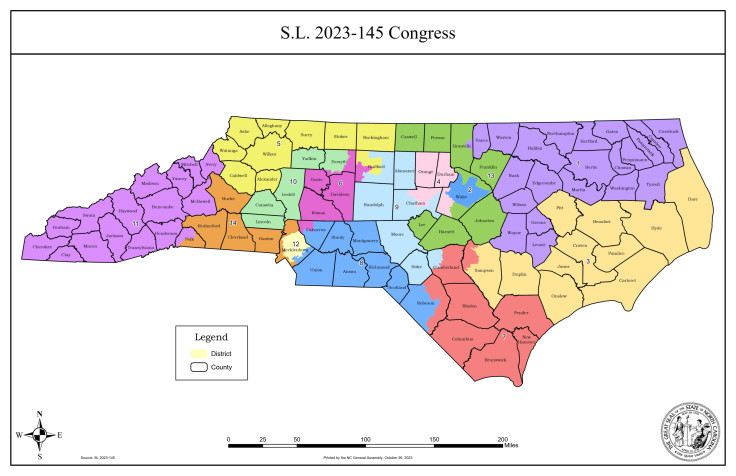
CHICAGO. — A group of Black and Latino voters filed a lawsuit in North Carolina, claiming that the state's new congressional map is unconstitutional and violates their 14th and 15th Amendments.
North Carolina's newest congressional map was passed into law in late October in a process that the defendants in the lawsuit claimed had "limited opportunity for public input," and that was passed in secrecy.
Usually, congressional maps are redrawn every ten years; however, North Carolina's maps have been redrawn four times in the past three years. And in 2022, after Republicans regained control of the state's legislature, redistricting provisions were overturned with what critics have described as a process riddled by opacity. They also determined that the state could gerrymander congressional maps.
According to the Associated Press, the new congressional map may help elect more Republicans to the House of Representatives.

The new map, according to the lawsuit, places minority voters in gerrymandered districts to minimize their voting strength in elections. The complaint specifically challenged Congressional Districts 1, 6, 12, and 14 as being unconstitutional and in violation of the 14th Amendment, which protects against the infringement of people's fundamental rights.
"North Carolina gained a congressional district after the 2020 Census almost entirely due to an increase in the state's minority population," reads a passage of the lawsuit. "But instead of granting minority voters the benefit of the state's increased representation, the General Assembly majority capitalized on that gain to increase their own power and decrease minority voting power."
The lawsuit points to specific congressional map changes that dilute the strength of minority voters. For example, Congressional District 1 (CD-1) was amended in 2023 to exclude minority communities like Pitt County and Greenville, they say.
"Minority voters were not placed in or removed from this district to comply with the Voting Rights Act. To the contrary, minority voters are now less able to elect candidates of their Choice," said the lawsuit.
In Congressional District 6 (CD-6), the lawsuit says, the new map seeks to limit Black and Latino representation by splitting minority communities into multiple congressional districts. The defendants allege Guilford County and Forsyth County, which were part of the CD-6 in 2022, are now split among five different districts despite being small enough to fit in a single congressional district.
In CD-12 and CD-14, the 2023 congressional map used race as a "predominant factor" in the redistricting process and removed minority communities from CD-14 and placed them in CD-12.
"By moving minority voters from one district to another, the 2023 Congressional Plan eliminates an existing minority opportunity district in CD-14. Minority voters in CD-12, meanwhile, already had the ability to elect their candidate of choice to the U.S. House of Representatives," the complaint said.
© 2025 Latin Times. All rights reserved. Do not reproduce without permission.





